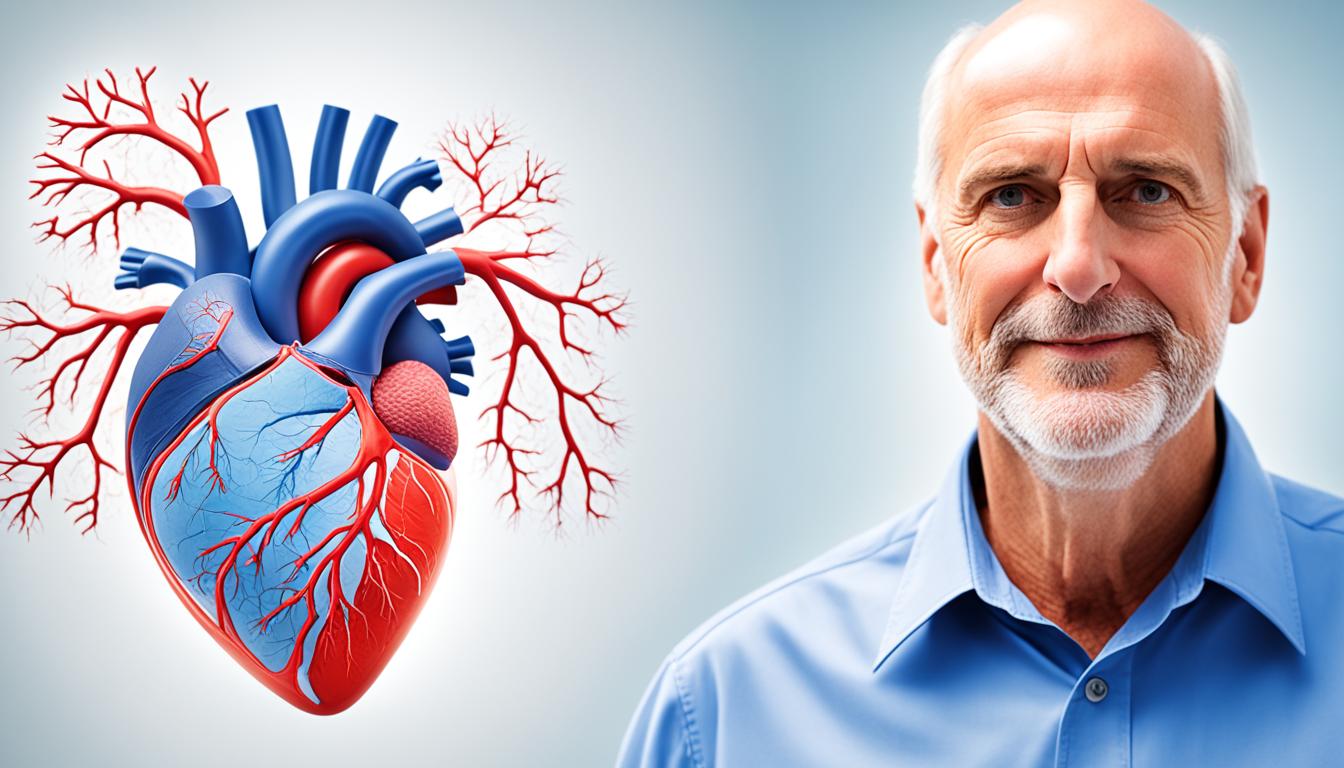Dilated cardiomyopathy is a heart disease that makes the heart’s chambers big and weak, especially the left ventricle. This condition may cause heart failure and other issues. It can be caused by genes, viruses, or other health problems.
People with dilated cardiomyopathy might feel tired, have a hard time breathing, and not be able to exercise much. Their legs and ankles might swell too. Doctors diagnose it using heart tests and medical checks.
There are a few ways to treat dilated cardiomyopathy. Patients can take drugs like beta blockers and ACE inhibitors to help with symptoms. If it’s very serious, they might need a new heart through a transplant. Also, doctors are looking into using stem cell therapy. This means using new heart muscle cells to replace the damaged ones.
Key Takeaways:
- Dilated cardiomyopathy is a heart disease characterized by the enlargement and weakening of the heart’s chambers, particularly the left ventricle.
- Symptoms of dilated cardiomyopathy include fatigue, shortness of breath, reduced exercise capacity, and swelling in the legs and ankles.
- Diagnosis of dilated cardiomyopathy is typically made through imaging tests and cardiac evaluations.
- Treatment options for dilated cardiomyopathy include medications, surgical interventions like heart transplant, and stem cell therapy.
- Stem cell therapy aims to replace damaged heart muscle cells with heart muscle stem cells.
Types of Cardiomyopathy and Their Causes
Cardiomyopathy is a group of heart diseases. They affect the heart muscle. Each type has its own signs and treatment. It’s important to know these for the best care and treatment.
Dilated Cardiomyopathy
Dilated cardiomyopathy (DCM) is known for the heart chambers getting larger. Especially, the left ventricle grows. Causes include:
- Limited blood flow to the heart muscle
- Infections, like viral myocarditis
- Alcohol abuse
- Certain medications
People with DCM often feel tired, breathless, and have swollen legs.
Hypertrophic Cardiomyopathy
Hypertrophic cardiomyopathy (HCM) means the heart walls thicken, mainly the left ventricle. It’s often due to gene mutations or increased heart work. Symptoms can be chest pain and fainting.
Restrictive Cardiomyopathy
Restrictive cardiomyopathy (RCM) happens when the heart muscle is too stiff. This affects how well the heart fills with blood and pumps it out. It might be hard to breathe, and legs can swell.
Arrhythmogenic Right Ventricular Cardiomyopathy
Arrhythmogenic right ventricular cardiomyopathy (ARVC) is rare. In this type, the right ventricle is replaced by fatty or scar tissue. Genetic issues play a big role. Heart rhythm problems and risk of sudden heart issues are signs.
Each cardiomyopathy type is unique. Treatment varies. Diagnosis and ongoing care are key for symptom control and life quality improvement.
| Cardiomyopathy Type | Causes |
|---|---|
| Dilated Cardiomyopathy (DCM) | Limited blood flow to the heart muscle, infections, alcohol abuse, certain medications |
| Hypertrophic Cardiomyopathy (HCM) | Genetic mutations, high blood pressure, increased heart workload |
| Restrictive Cardiomyopathy (RCM) | Stiffening and scarring of the heart muscle, conditions like myocardial infarction, fibrosis-inducing diseases |
| Arrhythmogenic Right Ventricular Cardiomyopathy (ARVC) | Genetic mutations affecting cell adhesion proteins |
Treatment Options for Dilated Cardiomyopathy
Treating dilated cardiomyopathy depends on its seriousness. Mild cases can often be managed with medications. These can help control symptoms and slow the disease’s progress. Doctors usually prescribe beta blockers, ACE inhibitors, diuretics, and anticoagulants for these patients.
For severe situations, surgery might be needed. A heart transplant is one possibility. This involves putting a healthy heart from a donor into the patient’s body. Or, doctors might suggest ventricular muscle resection. This surgery removes part of the heart muscle to improve its function.
A more recent treatment approach is stem cell transplant. Doctors are looking into this to see if it can help. It involves putting heart muscle stem cells into the heart. This might help replace damaged cells and make the heart work better.
In every case, patients should stick to a healthy diet and be careful with physical activity. They must also take their medicine as the doctor tells them to. Regular check-ups are important. They help ensure the treatment is working and keep the heart as healthy as possible.

